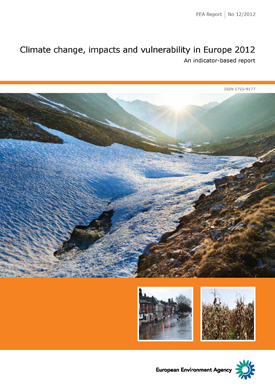Press release, 21 November 2012
Climate change evident across Europe, confirming urgent need for adaptation
Copenhagen. Climate change is affecting all regions in Europe, causing a wide range of impacts on society and the environment. Further impacts are expected in the future, potentially causing high damage costs, according to the latest assessment published by the European Environment Agency today.
 The report, ‘Climate change, impacts and vulnerability in Europe 2012’ finds that higher average temperatures have been observed across Europe as well as decreasing precipitation in southern regions and increasing precipitation in northern Europe.
The report, ‘Climate change, impacts and vulnerability in Europe 2012’ finds that higher average temperatures have been observed across Europe as well as decreasing precipitation in southern regions and increasing precipitation in northern Europe.
Cover: EEA
The report, ‘Climate change, impacts and vulnerability in Europe 2012’ finds that higher average temperatures have been observed across Europe as well as decreasing precipitation in southern regions and increasing precipitation in northern Europe. The Greenland ice sheet, Arctic sea ice and many glaciers across Europe are melting, snow cover has decreased and most permafrost soils have warmed.
Extreme weather events such as heat waves, floods and droughts have caused rising damage costs across Europe in recent years. While more evidence is needed to discern the part played by climate change in this trend, growing human activity in hazard-prone areas has been a key factor. Future climate change is expected to add to this vulnerability, as extreme weather events are expected to become more intense and frequent. If European societies do not adapt, damage costs are expected to continue to rise, according to the report.
Some regions will be less able to adapt to climate change than others, in part due to economic disparities across Europe, the report says. The effects of climate change could deepen these inequalities.
Jacqueline McGlade, EEA Executive Director said: “Climate change is a reality around the world, and the extent and speed of change is becoming ever more evident. This means that every part of the economy, including households, needs to adapt as well as reduce emissions.”
Observed climate change and future projections – some key findings:
see
http://www.eea.europa.eu/pressroom/newsreleases/climate-change-evident-across-europe
At the Helmholtz Centre for Environmental Research (UFZ) scientists are researching the causes and consequences of far-reaching changes to the environment. They are concerned with water resources, biological diversity, the consequences of climate change and adaptability, environmental and biotechnologies, bioenergy, the behaviour of chemicals in the environment, their effect on health, modelling and social science issues. Their guiding theme: Our research contributes to the sustainable use of natural resources and helps to secure this basis for life over the long term under the effects of global change. The UFZ employs 1,000 people in Leipzig, Halle and Magdeburg. It is financed by the federal government and the federal states of Saxony and Saxony-Anhalt.
http://www.ufz.de/
The Helmholtz Association contributes towards solving major and pressing social, scientific and economic issues with scientific excellence in six research areas: Energy, Earth and Environment, Health, Key Technologies, Structure of Matter, Aeronautics, Aerospace and Transport. The Helmholtz Association is Germany’s largest scientific organisation with over 33,000 employees in 18 research centres and an annual budget of approximately 3.4 billion euros. Its work stands in the tradition of the naturalist Hermann von Helmholtz (1821-1894).
http://www.helmholtz.de
